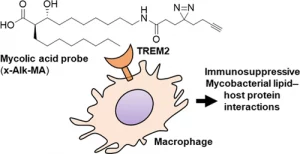Tuberculosis (TB), caused by Mycobacterium tuberculosis, remains one of the deadliest infectious diseases, claiming over a million lives globally each year. In a recent study scientists have developed a novel chemical probe to investigate a crucial part of the bacterium’s complex outer coat — a step that could lead to new therapeutic strategies against TB (Figure 1).
One reason TB is so persistent and deadly is its outermost layer, the mycomembrane. This barrier not only shields the bacterium from harsh environments and antibiotic attacks but also actively suppresses the host immune response, helping the pathogen survive inside infected macrophages.
The latest breakthrough: a new probe designed to mimic and trace mycolic acids, key lipid components of the mycomembrane.
The researchers designed a photoactivatable mycolic acid probe that allowed them to:
- Mimic natural immune response: The probe successfully stimulated an immune reaction in mouse macrophage cells, similar to natural mycolic acid.
- Track protein interactions: Using fluorescence scanning, they visualized the probe binding to proteins in the macrophages.
- Identify immune-suppressing mechanisms: Through immunoblotting, they discovered that the probe binds to TREM2, a receptor on macrophages that’s known to suppress immune activation.
Understanding how M. tuberculosis manipulates the host immune system at a molecular level is crucial for designing better treatments. While existing antibiotics must be taken for months—and resistance remains a growing problem—this probe opens a new path.
This innovative tool provides a platform for mapping host-pathogen interactions in unprecedented detail. As TB continues to challenge global health, especially in antibiotic-resistant forms, such chemical biology approaches offer new hope for next-generation TB therapies—including host-targeted immunomodulation.
Journal article: Kingsley C. et al., 2025. A Photoactivatable Free Mycolic Acid Probe to Investigate Mycobacteria–Host Interactions. ACS Infectious Diseases.
Summary by Stefan Botha











